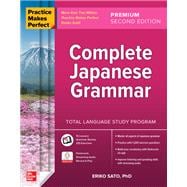Introduction
1 Introducing Japanese sounds, word order, and writing systems
Basic sounds
Pitch
Basic hiragana
Katakana
Kanji
Basic word order and particles
Speech styles
2 Nouns
Proper nouns
Respectful titles
Common nouns
Compound nouns
Demonstrative pronouns
Personal pronouns
The particle no
Kinship terms
3 Numbers
Bare numbers based on the Chinese system
The native Japanese number system
Class counters
Ordinal counters
Expressing time
Expressing months and days
Unit counters
me
4 Basic verb forms
Dictionary form
Masu form
Nai form
Stem form
Ru verbs and u verbs
Irregular verbs
Conjugation patterns
Te form
Ta form
Nakatta form
Conjugating verbs in the plain form
Conjugating verbs in the polite form
Progressive form
Potential form
Conjugating the copular verb desu
5 Verb types
suru verbs
Existential verbs aru and iru
Transitive and intransitive verbs
Inherently potential verbs
Verbs with hidden become/get
Verbs of giving and receiving
6 Auxiliaries that follow verbs in the te form
te + ageru, etc. (helpfulness)
te + iru (progressive, resulting, and habitual states)
te + shimau (completion)
te + oku (preparation)
te + miru (trial)
te + iku and kuru (progress)
te + aru (resulting state)
te + hoshii (desire)
7 Particles
o (direct object)
ga (subject)
ni (at, in, to)
de (at, by, in, with)
e (toward, to)
kara (from)
made (until)
no (of, ’s)
to, ya, and ka (listing nouns)
wa (topic)
mo (addition)
bakari (nothing but . . . )
shika (only)
dake (just/only)
demo (even)
8 Adjectives and adverbs
Adjective types
Basic adjective forms
Multiple subjects
Te forms of adjectives
Degree adverbs
Frequency adverbs
Adverbs derived from adjectives
Adverb + naru (change)
Adverbs made from onomatopoeia and mimetic words
Comparing two items
Equivalent-degree comparison
Comparing activities
Superlative comparison
9 Sentence types
Statements
Questions
Sentences with indefinite pronouns
Enriching statements
Suggestions, requests, and commands
10 Complex words and phrases
sugiru, etc. (verbal compound)
yasui / nikui (toughness)
tai (to want to do . . . )
garu (to show the signs of . . . )
Noun + rashii (typical)
Noun + no yo na (simile)
Noun + mitai na (simile)
Stem form + so na (appearance)
Volitional form + to omou (intention)
Volitional form + to suru (attempt)
yo ni suru/naru (change)
koto ni + suru/naru (decision)
koto ga dekiru (potential)
koto ga aru (experience)
11 Clauses
to and ka (verb complement clause)
mae ni (adverbial clause before . . . ) and ato ni (adverbial clause after . . . )
aida ni (adverbial clause during/while . . . )
uchi ni (adverbial clause during/while/before . . . )
toki ni (adverbial clause at the time when . . . )
nagara (adverbial clause simultaneously)
kara and node (adverbial clause because . . . )
ga and noni (adverbial clause although . . . )
Noun modifier clauses (which/that . . . )
12 Conjunctions
Listing nouns with to (exhaustive), ya (partial), ka (disjunctive), and mo (addition)
Listing verbs with te forms
Listing adjectives with te forms
Listing verbs and adjectives as examples using the tari form
Listing verbs and adjectives emphatically using shi
Sentence conjunctions
13 Conditionals
tara (whenever, when, if)
ba (whenever, when, if)
to (whenever, when)
nara (if it is the case that . . . .)
te mo (even if/though, no matter . . . )
Permission and prohibition
Obligation and discretion
14 Passives and causatives
Passive verbs
Direct passive
Indirect passive
Causative verbs
Make-causative and let-causative
Causative with auxiliary verbs of giving and receiving
Causative passive
15 Honorifics
Special honorific verbs
(r)areru (respectful form of verbs)
o . . . ni naru (respectful)
o . . . suru (humble)
Asking for permission very politely
Making a request very politely
Using go before a noun
Family terms
Honorific forms for adjectives
Honorific/polite question words
16 Review Exercises
Appendix A: Basic verb forms
Appendix B: Basic sentence predicate forms
Japanese–English glossary
English–Japanese glossary
Answer key








